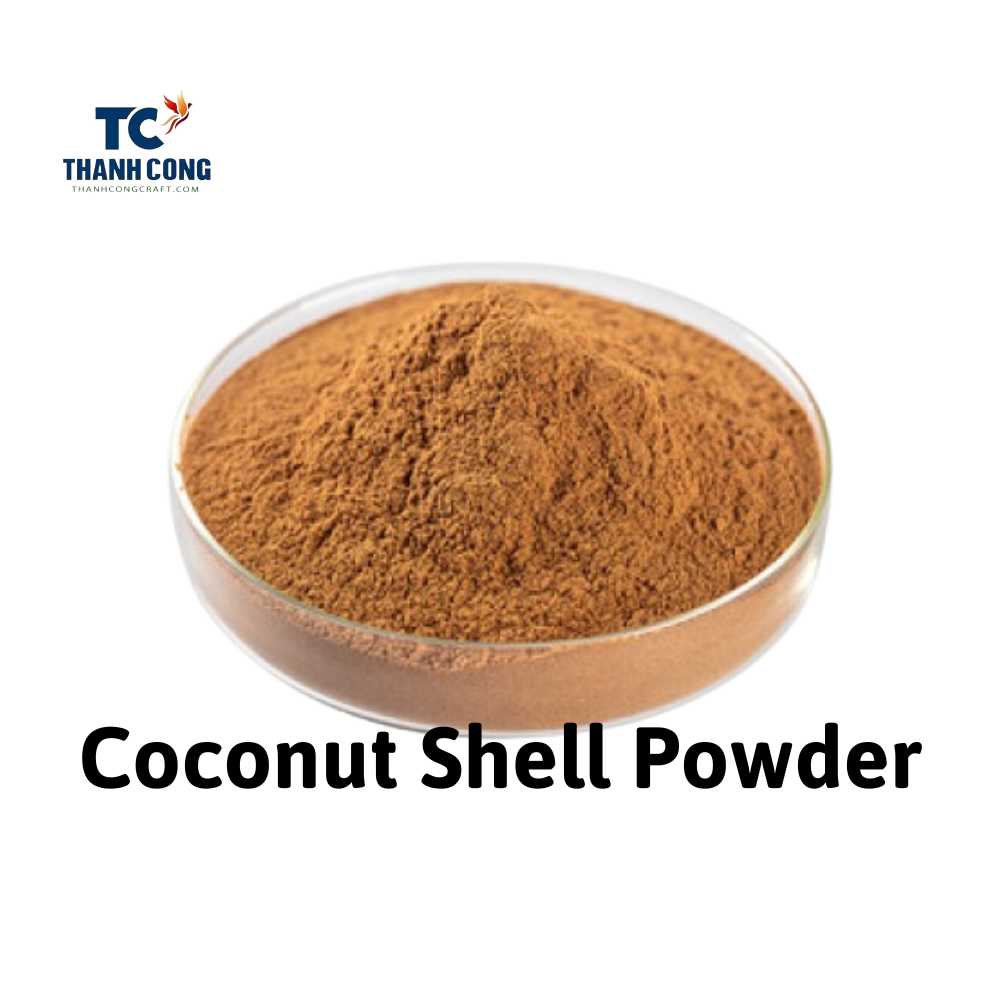-
21-07-2023, 05:06 PM #1
 Silver member
Silver member
- Ngày tham gia
- Nov 2015
- Bài viết
- 92
Coconut shell powder, Coconut shell charcoal briquettes
Coconut shell powder
Coconut shell powder is a fine, powdered material obtained from the processing of coconut shells. Coconut shells are the hard outer layer of coconuts, and they have a variety of applications beyond their traditional use as a vessel for coconut water and flesh.

The process of producing coconut shell powder involves crushing and grinding coconut shells into a fine powder. The resulting powder is light brown in color and has a texture similar to sawdust or ground coffee.
Uses of coconut shell powder:- Agriculture: Coconut shell powder is used as a soil conditioner and fertilizer additive. It helps improve soil structure, water retention, and nutrient absorption for plant growth.
- Industrial Applications: The powder can be used in various industries, including the production of mosquito coils, activated carbon, and industrial filters.
- Cosmetics: Coconut shell powder is sometimes used as an exfoliant in cosmetic products like scrubs and soaps due to its gentle abrasive properties.
- Arts and Crafts: It is utilized in various arts and crafts projects to create textures and decorative elements.
- Animal Bedding: The powder can be used as bedding material for small animals like rodents and reptiles.
- Activated Carbon Production: Coconut shells are a common source for producing activated carbon, which is used for water purification, air filtration, and in various chemical processes.
- Fuel: In some regions, coconut shell powder is used as a biomass fuel in cooking and heating applications.
- Filler Material: Coconut shell powder can be used as a filler material in the production of composite materials, such as in the manufacture of molded products.
It's essential to note that the properties and uses of coconut shell powder can vary depending on its specific production process and the intended application.
Coconut shell charcoal briquettes
Coconut shell charcoal briquettes are a type of charcoal made from coconut shells that have been processed and compressed into briquettes. This type of charcoal is becoming increasingly popular as an eco-friendly and sustainable alternative to traditional charcoal made from wood.
Here's how coconut shell charcoal briquettes are typically produced:- Collection of Coconut Shells: Coconut shells are collected as a byproduct of the coconut industry, ensuring that no part of the coconut goes to waste.
- Carbonization: The collected coconut shells are subjected to a process called carbonization. This involves heating the shells in the absence of oxygen to remove volatile compounds and moisture, leaving behind carbon-rich charcoal.
- Crushing and Sizing: The carbonized coconut shells are crushed into small pieces and then sized to the desired dimensions for briquette production.
- Mixing with Binder: To form briquettes, a natural binder (usually derived from plant-based materials) is mixed with the carbonized coconut shell particles. The binder helps hold the briquettes' shape and improve their burning properties.
- Compression: The mixture is then pressed into briquettes using specialized machinery. This compression step creates uniform and dense charcoal briquettes.
Coconut shell charcoal briquettes have several advantages over traditional wood charcoal:- Environmental Sustainability: Since coconut shells are a byproduct that would otherwise be discarded, using them for charcoal production helps reduce waste and promotes environmental sustainability.
- Renewable Resource: Coconuts are a renewable resource, and their shells can be continuously used to produce charcoal.
- Longer Burning Time: Coconut shell charcoal briquettes tend to burn longer and hotter than wood charcoal, making them more efficient for cooking and grilling.
- Low Smoke and Odor: Compared to some other charcoal types, coconut shell charcoal briquettes produce less smoke and have a mild, pleasant aroma.
- No Deforestation: By using coconut shells, there is no need to cut down trees for charcoal production, which helps preserve forests and natural habitats.
- No Chemical Additives: High-quality coconut shell charcoal briquettes often do not contain any chemical additives or fillers, making them a more natural and healthier option for grilling or cooking.
Due to their numerous benefits and eco-friendly nature, coconut shell charcoal briquettes are gaining popularity in the market, especially among environmentally conscious consumers and those looking for an alternative to traditional charcoal.
Check out Coconut Shell InstrumentView more random threads:
- chọn ly thủy tinh có khó không
- Bánh dứa Hong Kong khác lạ & lạ mắt
- Lạc lối trong khu rừng mộng mơ cùng Beast Party
- Ở đâu may gia công mũ chống giọt bắn
- Thanh lý pallet nhựa cũ Đaklak
- Những cách trị nấm vùng kín hiệu quả nhanh chóng tại nhà
- Những loại dụng cụ nhất định phải có trong bếp gia đình
- Nguyên lý hoạt động của máy máy lạnh âm trần
- Cần Gia - Đại lý bánh bao hàng đầu: Sự kết hợp hoàn hảo của khẩu vị và quality
- Thông tin căn hộ Biên Hoà Universe Complex Hưng Thịnh tại Biên Hoà
Các Chủ đề tương tự
-
Unleashing Creativity: The Art of Coconut Shell Craft
Bởi Thanhcongcraft trong diễn đàn Rao vặt tổng hợpTrả lời: 0Bài viết cuối: 17-07-2023, 05:32 PM



 Trả lời kèm Trích dẫn
Trả lời kèm Trích dẫn





Chính sách bảo mật là khía cạnh quan trọng trong việc bảo đảm an toàn thông tin cho người chơi khi tham dự các cổng Game Bai trực tuyến. Dưới đây là tổng quan về các chính sách bảo mật phổ quát mà...
Tổng quan về thông tin bảo mật khi...